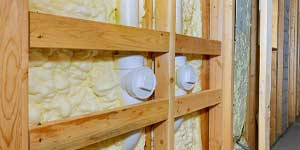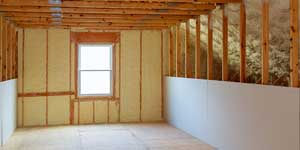Spray Foam St Louis - St Charles Insulation Company.


Should I Stay During Spray Foam Installation
If you have decided to get spray foam insulation in your attic, you may wonder if it’s safe to remain in the home while the project is underway. The short answer is yes, provided the area is well ventilated and well away from your living space. However, it must be installed properly and professionally by an insulation contractor in St. Charles with many years of experience.
This all comes down to the question: is spray foam insulation safe? It remains the most popular and common insulation type for new residential, commercial, and industrial properties, offering an effective way to seal all possible air leaks to result in top-notch energy savings as well as improved indoor comfort.
Spray foam insulation, when installed the right way by professionals, is a very safe insulation type. Because it is made with chemicals, it could be dangerous when handled or installed improperly. But once cured, it can improve the indoor air quality of the home, sealing all entry points where irritants such as dust and pollen could get in. Spray foam insulation also reduces the risk of mold because it controls indoor humidity.
Should You Stay or Go?
If you have another place to stay during application, go ahead and do so. But if you don’t, it’s OK to stay as long as you are not hovering over the crews as they go about their jobs. Some spray foam does have a slight odor, which is why it’s important to ensure excellent ventilation during application.
Because spray foam needs time to cure – usually anywhere from eight to 24 hours, it is recommended that you avoid long-term exposure to this type of environment during this time. This is why it’s not recommended that homeowners tackle this as a DIY project. Insulation contractors don all the proper safety gear, such as gowns, masks and goggles, while applying spray foam insulation.
If you must remain in the house, seal off the foamed area if possible and leave that portion open to the outdoors so it can be properly vented.
So, in a nutshell, when you hire a professional and experienced insulation contractor that uses high-quality products, you don’t have to leave your home during or right after installation, provided you stay away from the immediate area and the area is well-ventilated.
Call Addict Insulation in St. Charles MO
Our basement insulation contractors in St. Charles MO can provide a no-cost consultation on insulating your basement walls when you contact us at 636-233-7314.
Energy Saving BlogPopular Articles
- FAQs About Insulation in Missouri
- What Areas Should You Insulate Before Winter?
- The Greatest Risks to Your Home Caused by Poor Insulation
- Why Your Utility Bills Are So High and What You Can Do About It
- Can You Put New Insulation Over Old?
- Here Are 3 Ways Your Attic Could be Contaminated
- How Home Insulation Works in the Summer
- Tips and Tricks For Summer Insulation
- How to Fix Indoor Condensation
- Choosing the Right Spray Foam Contractor
- Why You Need Power Washing This Spring
- Don't Let Air Escape Your Home
- Tips For Saving on Your Energy Bills This Summer
- Should I Install a Radiant Barrier in My Home?
- Are You Wondering if Your Attic Has Enough Insulation?
- Do I Have to Replace Wet Insulation?
- Insulating Your Sunroom
- Should You Insulate Your Outdoor Spaces?
- All About Removing Insulation
- What to Know About Insulating a Crawl Space
- How to Spot Mold in Your Wall Insulation
- How to Prevent Moisture in Your Warehouse With Spray Foam Insulation
- What Factors Cause Heat Gain?
- The Problems That Come With Improper Insulation
- Insulation FAQs
- Why Should You Check the Insulation When Buying a Home?
- Why Seal and Insulate Your Home?
- Home Insulation: Safety and Health
- Should You Remove Old Insulation During Replacement?
- Can I Stay Inside My Home During Spray Foam Insulation Installation?
- Pros and Cons of Converting an Attic
- Pros and Cons of Converting an Attic
- When’s the Best Time to Insulate Your House?
- The Difference Between Blown Insulation and Spray Foam Insulation
- Is Your Garage Loft Too Hot or Too Cold? Heed These Tips
- 6 Health Benefits of Having a Quiet Home
- Insulation Prep is Critical For Installation
- The Dangers of Removing Insulation on Your Own
- What’s the Most Eco-Friendly Insulation?
- 7 Benefits of Spray Foam Insulation
- What is the Proper Insulation For Vaulted Ceilings?
- Signs Your Crawlspace Insulation Should be Replaced
- Why You Should Insulate Your Basement Walls
- Most Effective Ways to Soundproof Your Home Office
- How to Insulate an Old House
- 4 Tips to Make Your Attic More Energy Efficient
- Attic Insulation Problems: 5 Things to Look Out For
- What Causes Condensation on Interior Walls?
- How Deep Should Your Insulation Be?
- What to Consider When Choosing an Insulation Company
- Can You Add New Insulation Layers Over Old Ones?
- When Should You Remove Insulation?
- 7 Tips For an Energy Efficient Summer
- Creating a Healthy, Comfortable and Productive Workspace When Working From Home
- Why is Roof Ventilation Just as Important as Insulation?
- Why Spring is a Good Time to Insulate Your Attic
- 5 Signs of Damaged or Insufficient Insulation
- Is the Insulation in Your Walls Making You Sick?
- Under-Insulated Areas You May Be Overlooking
- The History Of Insulation.
- Pros and Cons of Attic Insulation
- Do You Need Insulation When Finishing a Basement?
- What is Drill and Fill Insulation?
- Which Insulation is Best for Garage Walls?
- How Air is Escaping Your Home and How to Prevent It
- 10 Things You Must Absolutely Insulate Before Winter
- 5 Reasons To Not DIY Insulation
- 5 Signs of an Under-Insulated Home
- 5 Benefits of Blown Insulation
- Cellulose vs. Fiberglass Insulation
- When is Insulation Removal Necessary?
- Tips to Keep Your Home Cool This Summer
- What is the Best Insulation for a Flat Roof?
- 5 Benefits of Power Washing
- Q & A About Insulation
- Reviews
- Energy Saving Blog






